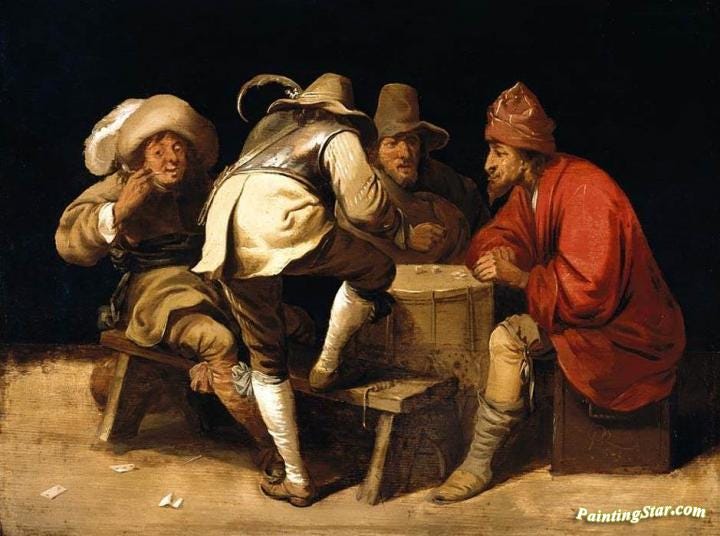Serving a Lost Gamble
Ukraine’s military is losing the fight not only against Russia but also against a gambling addiction epidemic.
This essay is the first in my new format “The Skirmish,” short and swift comments via texts and podcasts (in addition to my longer texts) that will be accessible to paid subscribers.
Ukraine is now on the verge of a catastrophic defeat. On the ground, recent Russian advances – especially since the fall of the key town (really, fortress) of Avdeevka – may not (yet) look rapid, but they are steady and have become highly predictable. Russia has the initiative, and it is a matter of Moscow’s decisions how fast the Ukrainian crumbling will be exploited. Once the Russian military commits its reserves (no, they have not yet entered the scene), the map could change with the kind of speed that will shock out of their dreams even the most propagandized victims of Western information warfare. This may happen very soon or a little bit later. But this war is now very unlikely to last into 2025.
We are also seeing clear signs of panic in the West and Kyiv/Kiev: Talk about the possibility of defeat has reached mainstream media and conformist “experts” – such as the German Christian Mölling - who have spent the last two years as relentless war boosters are rushing for the rhetorical exits. The blame game almost starts among those who have most to be ashamed of.
Ukraine’s president Volodymyr Zelensky, meanwhile, has told the public that he can imagine a peace based on the territorial status quo before the escalation into all-out-war of February 2022. For that, it is, of course, far too late. That solution – highly favorable to Ukraine, as its own then chief-negotiator has recently admitted - was on the table in the spring of 2022. But Kyiv/Kiev chose to be misled by the West which urged it to continue the war. As recent statements by the Russian leadership – all the way up to President Vladimir Putin – have made clear, such an offer will not be made again. This war will now end on terms much worse for Ukraine.
Against this dismal backdrop, Strana.ua, one of Ukraine’s most important and popular news websites, is reporting that the Ukrainian military is struggling with an online gambling “epidemic.” And make no mistake, this is not a “scourge,” as Strana.ua puts it, restricted to those serving in the rear. According to prominent Ukrainian lawmaker Oleksy Honcharenko, 90 percent of those on the “frontlines” are gambling and betting so badly that they lose enough to go into debt. He believes that the problem is pervasive and severe enough to “destroy the morale” of the troops. Their return into civilian life – if they are lucky enough to return, of course – is marred by having “nothing,” and they’ll be “ideal targets for the world of crime.” So Honcharenko.
An army of men and women abused for a Western proxy war, indoctrinated and also often enough brutally cajoled by a regime that has sold out Ukraine’s interests and hundreds of thousands of lives to the (still) neocon strategies of Washington – and all that for what?
To be admitted into NATO? But that will not happen and was never a good idea to begin with. To defend democracy and “civil society”? But Ukraine has no democracy; it is a regime every bit as personal as that of Russia, and, if anything, more corrupt. “Civil society”? A label for those with decent English and good connections to Westerners. It means nothing for the many others churned up in a meatgrinder of a war. To join “the West”? Wait for the backlash once this war is over – probably soon – and Ukrainians will have to process the fact that the West has used them and then dropped them.
In short, there is nothing really surprising about the fact that Ukrainian soldiers have found a destructive form of escapism. As one of them puts it, “the longer the war is lasting, the more you want to distract yourself from the things going on around you, just forget about everything.” Soviet troops in Afghanistan and American ones in Vietnam used drugs for the same purpose. And yet, there is something almost too symbolic about the Ukrainians’ choice of self-ruin: Gambling and betting. They are imitating the sins of their leaders, as if in a collective gesture of despair as well as what is left of defiance. And, of course, having an addiction that eats up everything you may want if you survive, is a way of saying that you don’t much believe in your surviving, or – perhaps even worse – that you have stopped caring.
Ukrainians do not deserve their government of shortsighted gamblers – and losers. They do not deserve to have become dispensable chips in a geopolitical game that the West has bet on – and is losing. They deserve a rapid end to this war and a return to a life in peace that they enjoy enough not to want to gamble it away.




The disconnect from reality currently being displayed by Zelensky is truly shocking. One suspects that the escapist drug-taking you allude to above must be permeating to the very highest levels civilian control in Ukraine as well.
Fascinating! The escape into gambling recalls Leo Tolstoy's picture of the Czarist army on the eve of Napoleon's invasion. Indeed, addiction to gambling plays a key role in the early plot of "War and Peace."